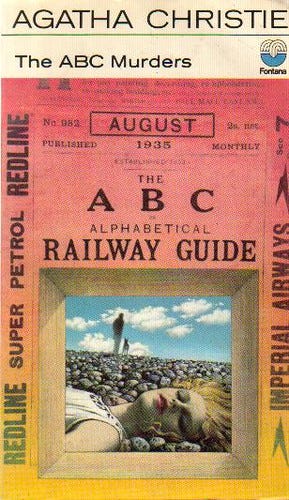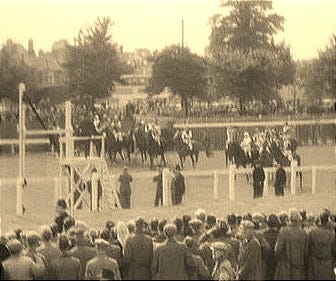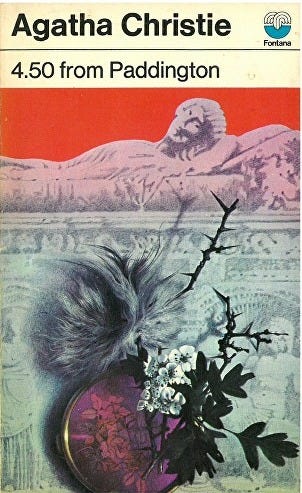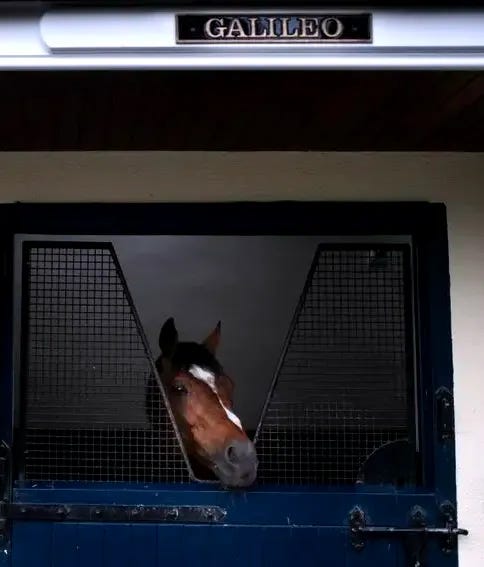This is a new version of an old post, redone because today is the running of the St Leger horse race at Doncaster, and it seemed apt… It starts, as my posts rather often do, with Agatha Christie: in this case her 1936 novel The ABC Murders, which contains a significant St Leger reference.
I have absolutely no doubt that everybody knows the plot of this novel, but this is how the Leger comes into it:
A serial killer with an alphabet fetish (as it seems) has murdered Alice Ascher in Andover, Betty Barnard in Bexhill and Sir Carmichael Clarke in Churston. As the terror rises, along with nationwide publicity for this most conceptually-minded of killers, he/she announces that the next crime will take place on September 11th at Doncaster; to which a po-faced detective declares that forewarned is forearmed and, given sufficient manpower, the police will lay hands, no problem, on the fiend. He is stopped in his tracks by this response:
‘It’s easy to see you’re not a sporting man, inspector… Man alive, don't you realize that on next Wednesday the St Leger is being run at Doncaster?’
How much do I love that ‘Man alive’… a two-word example of Agatha’s priceless gift of immediacy.
In fact I love the whole line, the whole worldly-knowledge aspect of it, and what it conjures: watching the St Leger with my father on brisk, cool, sunny afternoons (Leger weather. as I think of it) and learning about the grand old race, first run in 1776, named for the Irish colonel Anthony St Leger, the oldest of the five ‘classic’ races (two Guineas, Derby, Oaks, Leger) that were designed as the ultimate test of the thoroughbred.
Since the era of The ABC Murders, the Leger (whose 1936 pre-stalls start is pictured above) has been slowly migrating from its centrality within our national culture. So too, indeed, has Flat racing. Near-impossible to believe that the House of Commons used to take the day off for the Epsom Derby and people accepted - even applauded - the fact (I still would). This was when, like the Leger, the Derby was run on a Wednesday. The move to Saturday was supposed to make the major race meetings more available and accessible, thus more popular, yet oddly it has had the opposite effect: they have lost a specialness, a sense of the nation stopping its ordinary life to take note of them. Of course that will never come back.
Flat meetings - which I rarely attend these days; I have always preferred the thoroughbred to racing, but without racing there would be no thoroughbred - now have a mirage-like busyness; the crowds uneasily swollen with blokes disguised as extras from Peaky Binders, women lured by ‘best-dressed’ competitions, corporate hospitality, a scattering of random celebrities on freebies… within it all, there is scant sense of what Agatha called ‘the passionate, sport-loving English public’, whose sheer massy presence would (she suggests) serve to shield the murderer among them.
In the merry days when I had a column on the Racing Post (Flat season only, I LOATHE the jumps), I used the example of The ABC Murders to berate the clueless marketing strategies of the horseracing authorities. A serial killer today would - I wrote - do best to commit their crime in one of the racecourse bars. That, after all, is where the crowds are most tightly congregated, drinking themselves silly and sometimes nasty, while the glorious real-life spectacle, all that beauty and excitement just a few metres away, plays out on flickering screens above their heads.
And yet, and still, there is the thoroughbred. That superlative creature, with its strange, tugging duality: the accreted weight that it carries of a 300-plus year history (the term ‘thoroughbred’ was first recorded in 1713), and the sheer vital horse-ness of a young animal. To those who worship him or her, today’s St Leger is indeed special. Within the field (and carrying my sentimental bet, although I cannot bear to watch, in fact I sort of dread the whole thing) is the last significant three-year-old sired by Galileo, the pre-eminent stallion of the modern era, who died in 2021. The statistics about him are remarkable, perhaps unrepeatable - he has sired more than a hundred Group/ Grade One winning horses, including of last year’s St Leger, and a record five Epsom Derby winners. But it is more than that. He reminded a sometimes foolish sport that equine perfection is about more than just running fast. A true and typical Galileo has a class that derives from honesty, integrity, nobility. His death was a profound demarcation line in the story of the thoroughbred; which at the same time, by definition, is a continuum. His progeny are everywhere, and in that sense he is still alive.
I saw Galileo win the Derby in 2001 - can remember exactly what I was wearing, but more than that I remember the look of him, the depth and dimensionality of his body, the coat that shone like melting Charbonnel and Walker, the kindness of his eye. He was abundant in charisma but without arrogance, with a kind of generosity in his running that filled spectators with happiness - when I saw him win again, at Ascot, I remember speaking to a woman who had travelled from Ireland for the day just to glimpse him - and which has transmitted itself to so many of his offspring. Such is his dominance within thoroughbreeding that only one horse in the St Leger field is not his direct descendant. And then there is this one, this son, whose blood runs thick with history, and who is blissfully free of that knowledge.
Agatha, incidentally, would have been watching today on her despised television. She was born into a society that held racing to its collective heart. When travelling with her second husband Max Mallowan, or staying with him on archaeological digs, Agatha would write to her literary agent and ask him to place her bets (within their correspondence file is a letter congratulating her on backing the winner of the 1948 Derby). And racing appears periodically within her novels, not just in The ABC Murders: the Epsom Derby features as a means to establish alibis in Murder is Easy, while in 4.50 from Paddington an alibi is broken, by a taxi driver who ‘identified the day because a horse called Crawler had won the 2.30 and he’d had a tidy bit on’.
‘Thank God for racing!’ says the policeman in charge.
Thank God for the thoroughbred, I say.







Fascinating stuff. I’m wondering, though, about the place of the one genre writer above all who’s indelibly associated with racing—former Champion Jockey, and so on—Dick Francis.
How totally brilliant of you to remind me of Molly Keane! She is on my bookshelf and I haven't read her for a hundred years. (Since the days just after university, at least.) I'm going to go back and remind myself why I loved her so. Thank you!